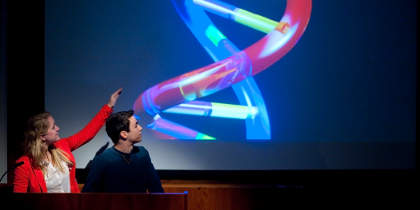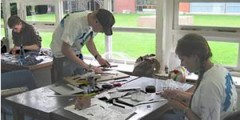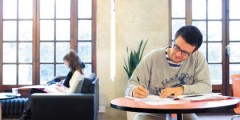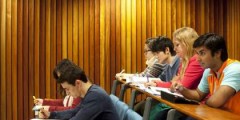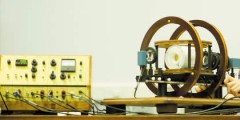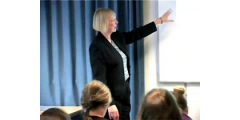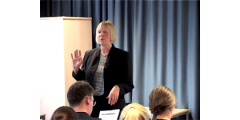Dealing with information overload: student teach thy self
September 29, 2005
Ian Spendlove: “The Biomedical Sciences are subjects that are or appear to be heavily dependent on a large volume of information with an apparent emphasis on facts and content. Traditional didactic teaching approaches are common practice in these subjects. In order to address the potential for information overload, avoid student disengagement and stave off embarrassing …
The “Tour de Pasenville”: an induction exercise
June 27, 2005
Tim Heath spoke to Kate Exley about the “Tour de Pasenville”, a cross-year design project modelled on the “Tour de France”, which aims to introduce new students to key concepts in design and each other in a friendly competitive exercise that runs in the second week of Semester 1. This is an innovative School based …
Creativity and criticism: spotting a gap and motivations to change
Peter Howarth: “I joined the Department in 2000 and as part of my teaching, began a module on Modern Poetry. I realised that the students had to develop an understanding of the shape and form of poetry, and how form affects meaning; students read poetry as if they were reading a novel, and when asked …
Assessing a portfolio of creative writing
June 13, 2005
Peter Howarth: Assessing a portfolio of creative writing “I joined the Department in 2000 and as part of my teaching, began a module on Modern Poetry. I knew that students wanted to do creative work quite strongly, and could be helped to write better and understand other poets better by doing so. But the problem …
Did curiosity do anything more than kill the cat? The place of curiosity in Higher Education
September 14, 2004
Boyan Bonev, Catherine Cowley, Michelle Hall, Henrik Nilsson, Frazer Pearce, Theo Stickley and Sarah Westwater-Wood: “The University of Nottingham’s, Learning and Teaching Strategy for 2002-2005 states that the University is committed to excellence in the advancement and communication of knowledge. One of the ways in which it aims to advance knowledge is by “equipping students …
The acoustics of teaching facilities: a case study of the University of Nottingham
Peter Rutherford: “The acoustical design of lecture theatres, seminar rooms and classrooms is of paramount importance in meeting the required speech intelligibility for delivering effective teaching, irrespective of the teaching style employed. Given the nature of universities delivering content, new information is presented at such intensity that it is essential that speech intelligibility meet the …
Teaching a physics laboratory module to blind students
July 31, 2004
Janette Dunn and Lara Meredith: Background: “Disability Legislation finally made its way into Higher Education in September 2002 in the form of the Special Educational Needs and Disability Act (SENDA or Part IV of the Disability Discrimination Act). “With this change there was a need to improve staff awareness of the ways they could provide …
Mathematics Electronic Learning Environment in Engineering and Science (MELEES)
July 30, 2004
Stephen Hibberd and Cliff Litton: “MELEES is a web-based environment, developed since 2002, to support students who take mathematics modules as a part of their course. In 2004-5 over 2000 students across Engineering and Science at the University of Nottingham used MELEES to support their learning. “The principal challenge within the service teaching of mathematics …
The importance of visual aids
July 9, 2004
Video >> Do Coyle: “Throughout the visuals have got to be, well any of the aids you would use have got to be relevant. But now, with being able to transport images from the Internet, for example, we’re no longer forced into scruffy overheads, transparencies and so on. We can actually use colour and image …
Beginning a session with an exercise
Video >> Do Coyle: “OK. Could you, first of all, look inside your pack and find the vocabulary list. “Now as future language teachers you’re all going to be dealing with vocabulary. So what I’d like you to do first of all is to take the vocabulary list, I’m going to give you 3 minutes …

